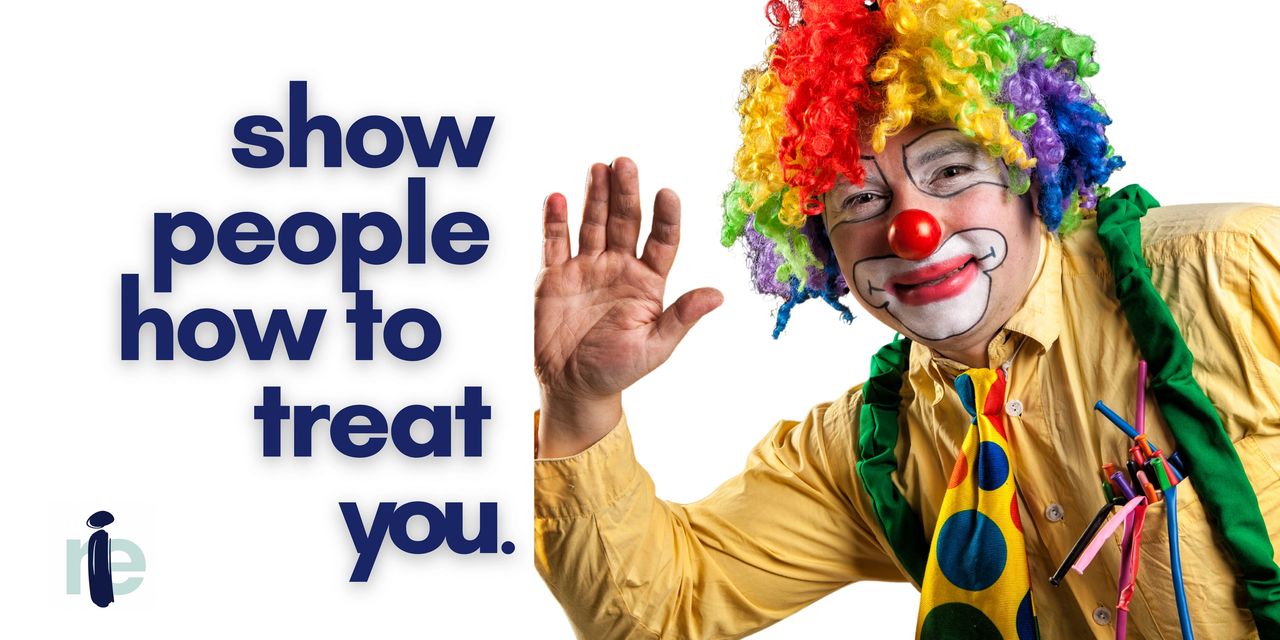Human connection landscapes are intricate places of self-discovery. So given my tendency towards analytic combined with joy I get from poetic wordplay – it surprises me to say I find most of my powerful ideas come from random bits of accidental folk wisdom sounding quips, like . . .
“you show people how to treat you”
It was an automatic retort to a client giving me a golden rule excuse that I wasn’t in the mood to endorse. It was out of my mouth before I even understood what I was saying. Thoughtlessly hit the nail on the head and accidentally brought the profound relationship between self-respect, personal boundaries, and the dynamic interplay emerging during therapeutic into view. The work all encompassed in a simple off cuff 2 second phrase.
… another ‘davidism’.
What’s the nail here exactly? Okay, picture a world where personal boundaries dissolve, and self-respect takes a backseat. A world where we find ourselves vulnerable to psychopathic predators’ whims. Or if you haven’t come that view of reality yet … a world at the mercy of the thoughtless actions of well-intended people (the irony isn’t lost on me). That is the sobering reality for many individuals who struggle with self-respect.
As someone who has wrestled with these very issues firsthand and having been catapulted into my own psychological growth I am aware of the need for more than just anecdote and want to provide a solution that goes beyond my one line platitudes and gets into the theoretical foundations of self-respect and boundaries.
Consider walking into someone’s house. The way they maintain their living space sets the tone for our behavior within that space. If it’s tidy and organized, we instinctively remove our shoes and adhere to a certain level of decorum. On the other hand, if it’s chaotic and messy, we might feel more comfortable leaving our shoes on or helping ourselves to a casual beverage. Similarly, in our interactions with others, how we treat ourselves sends signals to those around us about how we expect to be treated.
For instance, if we constantly apologize for ourselves or diminish our own value, others may begin to blame us when things go wrong. If we remain silent and dismiss ourselves from conversations, others may dismiss us as well. The way we allow ourselves to be treated becomes the blueprint for how others perceive and treat us. Therefore, cultivating self-respect can begin by consciously being aware of the signals we send to others through our behavior and attitudes.

THE DANCE OF PERCEPTION
As social organisms, our survival instincts drive us to continually scan our environment and gather social cues. We instinctually seek information to guide our behavior, particularly in the context of interpersonal interactions. Humans possess a psychological predisposition to be hypervigilant about appropriateness, as it impacts our acceptance within the safety of the social group.
Our possessing an innate ability to pick up on subtle cues, shaping our interactions. I’ve found that being mindful of my present thoughts, behaviors, and physical presence is pivotal. Once, I caught myself falling into a victim mentality, blaming external forces for my experiences. But upon embracing my agency and taking responsibility for my actions, I discovered the power to navigate intricate social dynamics. It was liberating to realize that by being present and intentional in my interactions, I could create more meaningful connections.
Psychotherapy, too, at its core, is a dance of perception and exploration. As therapists, we become attuned to the intricate web of verbal and nonverbal cues, working in synchrony with our clients. Reflecting on my experiences, I’ve observed that by embodying self-respect, I fostered an environment where clients felt heard and validated. It was through this mindful presence that deep psychological explorations emerged, enabling us to unravel the complexities of their inner world. The dance of perception, infused with self-respect, became a transformative force in the therapeutic process
By acknowledging the profound influence this has on our lives, we gain the ability to be mindful of what we can control. While we cannot dictate how others perceive or treat us, we can shape our own thoughts, behavior, and boundaries. This perspective empowers us to focus our attention on self-respect, rather than becoming victims or shifting blame onto external factors that lie outside our sphere of influence.
CULTIVATE SELF-RESPECT
Self-respect forms the cornerstone of healthy relationships and authentic connections. It involves developing a deep appreciation for ourselves and recognizing our intrinsic worth. When we cultivate self-respect, we carry ourselves with confidence, set clear boundaries, and demand respect from others.
To nurture self-respect, it is essential to engage in practices that promote self-care, embrace our strengths, and acknowledge our achievements. By developing a sense of self-worth independent of external validation, we strengthen our emotional well-being and enhance our ability to build authentic relationships.
ESTABLISH BOUNDARIES
Renowned self-help guru Brené Brown sheds light on the significance of boundaries in fostering authentic relationships. Boundaries act as the emotional fences that protect our well-being and preserve our authenticity. By practicing assertiveness and effective communication, we can assert our needs while still allowing for genuine connections to flourish.
STRENGTHEN EMOTIONAL RESILIENCE
Psychologist Daniel Goleman’s groundbreaking work on emotional intelligence unveils the importance of honing emotional resilience. This component equips us with the skills needed to navigate challenges, setbacks, and conflicts without compromising our self-respect. Recognizing our emotional triggers, practicing self-care, and seeking support are crucial steps in building our emotional resilience.
DO SOME REFLECTION WORK
Give these questions some space to roll around.
1. How do you currently perceive your own self-respect and the boundaries you have established in your relationships?
2. Are there any specific areas or relationships where you feel your self-respect is compromised? What actions can you take to address this?
3. How do you communicate your boundaries effectively without diminishing your relationships with others?
4. In what ways can emotional resilience contribute to healthier relationships?5. Reflect on a relationship where you struggled with maintaining boundaries. How could stronger self-respect have influenced the outcome?
As we strive to build a community that values self-respect and nurturing relationships, I invite you to share your thoughts and experiences in the comments section below. Your insights may inspire and support others in their journeys toward authenticity and self-growth. If you would like to work with me individually in an endeavor to embark on your own transformative journey towards cultivating self-respect and setting healthy boundaries . . . reach out to me at david@reamtexas.com

